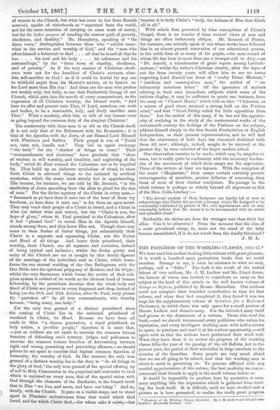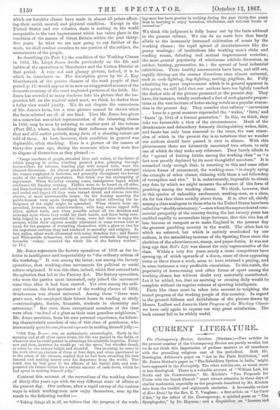THE PROGRESS OF THE WORKING CLASSES, 1832-67.* WE have read
this modest-looking little volume with great pleasure. It is worth a hundred more pretentious books that we could mention. Strange to say, it owes its existence to what we may, perhaps, call a "fluke." The book is the result of the united labour of two authors, Mr. J. M. Ludlow and Mr. Lloyd Jones, the former of whom was invited to contribute an essay on the subject at the head of this article to the well known volume of Essays on Worm, published by Messrs. Macmillan. Our authors could not complete their intended contribution in time for that volume, and when they had completed it, they found it was too large for the supplementary volume of Questions for a Reformed Parliament, in which there was only space for a small portion of Messrs. Ludlow and Jones's essay. For the intended essay itself had grown to the dimensions of a volume. Those who read the book,—and we should recommend every politician who values his reputation, and every intelligent working-man with half-a-crown to spare, to purchase and read it at his earliest opportunity,—will agree with us that the authors hare performed their work well. Whet they have done is to review the progress of the working classes frOm the year of the passing of the old Reform Act to the present year, the period of their admisiion in large numbers to the exercise of the franchise. Some people are very much afraid that we are all going to be ruined, now that the working-man is about to assist in governing us. To persons afflicted with any morbid apprehensions of this nature, the best mediciike we can re- commend their friends to apply is the small volume before us.
It would be impossible to produce here by quotation or sum- mary anything like the impression which is gathered from read- ing the book itself. It is difficult, until we have studied such a picture as is here presented, to realize the really great progress
• Peogros of the 1Porking Classes, 1832-1807. By J. M. Ludlow and Llo3d Jones. London: Alexander Strahau. 1857.
which our humbler classes have made in almost all points affect- ing their social, mental, and physical condition. Except in the United States and our colonies, there is nothing in the world comparable to the vast improvement which has taken place in the condition of the masses of Great Britain within the past thirty- Eve years. In what we are now going to say further of the work, we shall confine ourselves to one portion of the subject, the amusements of the people.
In describing (in Part I.) the condition of the Working Classes in 1832, Mr. Lloyd Jones dwells particularly on the life and habits of the operatives in Manchester and the Cotton District at that period. A very sad and gloomy picture, indeed, it is to which he introduces us. The desziription given by Sir J. Kay Shuttleworth of the potato dinners of the work people of that period (p. 11) would appear to us now an exaggerated account of the domestic economy of the most neglected portions of the Irish. Mr. Jones.has crowded so many shadows into his picture that the im- pression left on the readers' mind must, we think, be darker than a fuller view would justify. We do not dispute the correctness of Mr. Jones's facts, but a true picture cannot be drawn when the facts selected are all of one kind. That Mr. Jones has given us a somewhat one-sided representation of the labouring classes in 1832, may be seen by referring to another part of the volume (Part III.), where, in describing their influence on legislation at that and still earlier periods, many facts of a cheering nature are told of them. At best, however, their condition in general was deplorable, often shocking. Here is a picture of the masses of thirty-five years ago, during the moments when they were free to dispose of themselves as they pleased
Large numbers of people attended fairs and wakes, at the latter of which jumping in sacks, climbing greased poles, grinning through horse-collars for tobacco, hunting pigs with soaped tails, were the choicest diversions. An almost general unchastity prevailed amongst the women employed in factories, and generally throughout the lowest ranks of the working population. But drink was the mainspring of enjoyment. When Saturday evening came, indulgences began which continued till Sunday evening. Fiddles were to be heard on all sides, and limp-looking men and pale-faced women thronged the public-houses, and reeled and jigged till they were turned drunk and riotous into the streets, at most unseasonable hours. On the Sunday morning the public-houses were again thronged, that the thirst following the in- dulgence of the night might be quenched. When church hour ap- proached, however, the churchwardens, with long staves tipped with silver, sallied forth, and when possible seized all the drunken and unkempt upon whom they could lay their hands, and these being care- fully lodged in a pew provided for them, were left there to enjoy the sermon, whilst their captors usually adjourned to some tavern near at hand, for the purpose of rewarding themselves with a glass or two for the important services they had rendered to morality and religion. In fact, sullen, silent work alternated with noisy, drunken riot ; and Easter and Whitsuntide debauches, with an occasional outbreak during some favourite wakes,' rounded the whole life of the factory worker." (p. 18.) Mr. Jones represents the factory operatives of 1832 as far in- ferior in intelligence and respectability to "the ordinary artizan of the workshop." It was among the latter, not among the factory operatives, that working-class movements for political or social reform originated. It was this class, indeed, which first entered into the agitation that led to the Factory Act. The factory operatives, who were the parties most interested, only joined the movement some time after it had been started. Yet even among the ordi- nary artizans, the best specimens of the working classes of 1832, drunkenness was almost universal. Among them "there were grave men, who employed their leisure hours in reading or study —entomologists, florists, botanists, students in chemistry and astronomy." But even these exceptional members of the class were often "as fond of a glass as their most graceless neighbours." Mr. Jones mentions, from his own personal experience, the follow- ing characteristic anecdote of one of this class of gentlemen, who irreverently spent his own funeral expenses in making himself jolly:— " Old Tom 13— was an enthusiastic entomologist. Early in the morning and at all other spare hours, his life was passed in the fields, or wherever else he could pursue to advantage his scientific inquiries. Every now and then, however, he would go 'on the spree,' but whether drank or sober ho was always bright and cheerful. One morning, he came to his work after an absence of three or four days, and when questioned as to the cause of his absence, replied that he had been attending his own funeral, and making merry over his departure from the world. The truth was, he had gone to the officers of his burial club, and com- pounded his future claims for a certain amount of cash down, which he had spent in making himself jolly."
Contrast this account of the recreations of the working classes of thirty-five years ago with the very different state of affairs at the present day. Our authors, after a rapid survey of the various ways in which working-men now enjoy themselves, sum up the result in the following verdict :—
" Taking things all in all, we believe that the progress of the work-
ing-man has been greater in nothing during the past thirty-five years than in learning to enjoy harmless, wholesome, and rational forms of recreation."
We think this judgment is fully borne out by the facts adduced in the present volume. We can do no more here than barely allude to the immensely increased cultivation of music by the working classes ; the rapid spread of entertainments like the penny readings ; of institutions like working men's clubs and reading rooms, debating and mutual improvement societies ; the more general popularity of wholesome athletic diversions, as cricket, boating, gymnastics, &c. ; the spread of local industrial exhibitions. These healthy amusements have been, and still are, rapidly driving out the coarser diversions once almost universal, such as cock-fighting, dog-fighting, ratting, pugilism, &c. Fully admitting the great improvement which is in general apparent in this point, we still hold that our authors have too lightly touched the darker side of the picture presented at the present day. They have, for instance, totally overlooked a fact of such gigantic propor- tions as the vast increase of horse-racing revels as a popular recrea- tion in the present day. They consider that railway excursions . . . have in a great measure superseded the wakes," fairs,' and
feasts' (p. 194) of a former generation." In this, we think, they take too favourable a view of the circumstances. Much of the drunkenness and debauchery formerly distinguishing wakes, fairs, and feasts has only been removed to the races, the vast exten- sion of which in the present day is so notorious that we wonder our authors should have passed it over in silence. With this. phenomenon there are intimately associated two others, to only one of which do they make any reference. They barely allude to the "spread of betting habits among the working class" as " fact now greatly deplored by its most thoughtful members." It is remarked truly enough that, in resorting to this and some other vicious forms of amusement, the working-man "is simply aping the example of other classes, claiming with them a sad fellowship of corruption and vice." It is, unfortunately, impossible to obtain any data by which we might measure the advance of this form of gambling among the working classes. We think, however, that in this species of unhealthy excitement, working-men, as a class, sin far less than those socially above them. It is, after all, chiefly among a class analogous to thosewho in the United States havebeen called the " shoddy aristocracy,"—m en whom the unprecedented com- mercial prosperity of the country during the last twenty years has. enabled rapidly to accumulate large fortunes, that this vice has of late become so rampant as to make England in the present day the greatest gambling country in the world. The other fact to. which we referred, but which is entirely overlooked by our authors, is the astonishing increase of the Sporting Press since the abolition of the advertisement, stamp, and paper duties. It was not long ago that Bell's Life was almost the only representative of the class. Within a very few years nearly a score competitors have sprung up, of which upwards of a dozen, some of them appearing twice or three times a week, seem to have attained a paying, and in some instances a very profitable circulation. To this result, the popularity of horse-racing and other forms of sport among the working classes has without doubt very materially contributed. Let it be added, too, that no morning or evening daily would be complete without its regular column of sporting intelligence.
Facts like these must be taken into account in weighing the recent progress of the working people of this country-. In regard to the general fullness and faithfulness of the picture drawn by Messrs. Ludlow and Jones in their Progress of the Working Classes we have only again to express our very great satisfaction. The book cannot fail to be widely useful.































 Previous page
Previous page